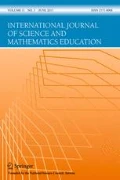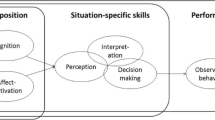Abstract
Adopting the concept that “decisions can be seen as argument-driven actions,” the purpose of this study was to apply the argumentation structure raised by Stephen Toulmin (1958) to capture two science teachers' instructional decision-making mechanisms in their teaching practices. The two case teachers were chosen because of their close estimations of their students' achievement outcomes and both were in their transition stages from competent teachers to proficient ones. A science teaching observation coding schedule (STOCS) was designed to be used in classroom observations, and all these quantitative data were collected to be converted into four issues for the two teachers to justify their ways of teaching. A semi-structure interview was conducted to analyze why and how these two case teachers made their instructional decisions. The results indicate that although they knew that their students could not fully understand what they taught in the class, their teaching strategies were still teacher-dominated modes. What really influenced their instructional decisions included external context factors (e.g., examination pressure, subject contents, limited time and classroom management) and internal experiential factors (e.g., personal educated experiences, beliefs and understandings of constructivism and inquiry). Finally, the authors suggest that science teachers' instructional decision making mechanisms can be appropriately represented by case teachers' argumentations structure.
Similar content being viewed by others
References
Abrams, E. (1998). Talking and doing science: Important elements in a teaching-for-understanding approach. In J.J. Mintzes, J.H. Wandersee & J.D. Novak (Eds.), Teaching science for understanding: A human constructivist view. San Diego, CA: Academic Press.
Aikenhead, G. (1984). Teacher decision-making: The case of Prairie High. Journal of Research in Science Teaching, 21, 167–186.
Anderson, R.D. (2002). Reforming science teaching: What research says about inquiry. Journal of Science Teacher Education, 13(1), 1–12.
Anderson, R.D. & Helms, J.V. (2001). The ideal of standards and the reality of schools: Needed research. Journal of Research in Science Teaching, 38(1), 3–16.
Berliner, D.C. (1988, February). The development of expertise in pedagogy. Paper presented at the meeting of American Association of Colleges for Teacher Education, New Orleans, LA.
Börger, H. & Tillema, H. (1993). Transferring knowledge to classroom teaching: Putting knowledge into action. In C. Day, J. Calderhead & P. Denicolo (Eds.), Research on teacher thinking: Understanding professional development (pp. 185–197). The Falmer Press.
Bryan, L.A. (2003). Nestedness of beliefs: Examining a prospective elementary teacher's belief system about science teaching and learning. Journal of Research in Science Teaching, 40(9), 835–868.
Bullough, R.V. (1992). Beginning teacher curriculum decision making, personal teaching metaphors, and teacher education. Teaching and Teacher Education, 8(3), 239–252.
Bybee, R.W. (1993). Reforming science education: Social perspectives and personal reflections. Teachers College Press, Columbia University.
Cartier, J.L. & Stewart, J. (2000). Teaching the nature of inquiry: Further developments in a high school genetics curriculum. Science and Education, 9, 247–267.
Clark, C.M. & Peterson, P.L. (1986). Teachers' thought processes. In M.C. Wittrock (Ed.), Handbook of research on teaching (pp. 255–296). New York: Macmillan Publishing Company.
Cohen, L., Manion, L. & Morrison, K. (2001). Research methods in education. London: Routledge–Falmer.
Driver, R., Newton, P. & Osborne, J. (2000). Establishing the norms of scientific argumentation in classrooms. Science Education, 84, 287–312.
Duffee, L. & Aikenhead, G. (1992). Curriculum change, student evaluation, and teacher practical knowledge. Science Teacher Education, 76(5), 493–506.
Duschl, R.A. & Wright, E. (1989). A case study of high school teachers' decision-making model for planning and teaching science. Journal of Research in Science Teaching, 26(6), 467–501.
Gunstone, R.F. & Champagne, A.B. (1990). Promoting conceptual change in the laboratory. In E. Hegarty-Hazel (Ed.), The student laboratory and the science curriculum. London: Routledge.
Hart, C., Mulhall, P., Berry, A., Loughran, J. & Gunstone, R. (2000). What is the purpose of this experiment? Or can students learn something from doing experiments? Journal of Research in Science Teaching, 37(7), 655–675.
Hegarty, S. (2000). Teaching as a knowledge-based activity. Oxford Review of Education, 26(3–4), 451–465.
Jiménez-Aleixandre, M.P. & Pereiro-Muňoz, C. (2002). Knowledge producers or knowledge consumers? Argumentation and decision making about environmental management. International Journal of Science Education, 24(11), 1171–1190.
Kagan, D.K. & Tippins, D.J. (1991). How teachers' classroom cases express their pedagogical beliefs. Journal of Teacher Education, 42(4), 281–291.
King, K., Shumow, L. & Lietz, S. (2001). Science education in an urban elementary school: Case studies of teacher beliefs and classroom practices. Science Education, 85, 89–110.
Kuhn, D. (1992). Thinking as argument. Harvard Educational Review, 62(2), 155–178.
Lazarowitz, R. & Tamir, P. (1994). Research on using laboratory instruction in science. In D.L. Gabel (Ed.), Handbook of research on science teaching and learning (pp. 94–128). New York: Macmillan.
Lee, S.T. & Lin, H.S. (2003, January). The gap between students' achievement outcomes and teachers' expectations in the learning of stoichiometry. Paper presented at the Third International Conference on Science, Mathematics and Technology Education, East London, South Africa.
Levitt, K.E. (2001). An analysis of elementary teachers' beliefs regarding the teaching and learning of science. Science Education, 86(1), 1–22.
Lipshitz, R. (1993). Decision making as argument-driven action. In G.A. Klein, J. Orasanu, R. Calderwood & C.E. Zsambok (Eds.), Decision making in action: Models and methods. Norwood, New Jersey: Ablex Publishing Corporation.
Lumpe, A.T., Haney, J.J. & Czerniak, C.M. (1998). Science teacher beliefs and intentions to implement Science-Technology-Society (STS) in the classroom. Journal of Science Teacher Education, 9(1), 1–24.
Lunetta, V.N. (1998). The school science laboratory: Historical perspectives and contexts for contemporary teaching. In B. Fraser & K. Tobin (Eds.), International handbook for science education. Dordrecht: Kluwer.
Lyons, L.L., Freitag, P.K. & Hewson, P.W. (1997). Dichotomy in thinking, dilemma in actions: Researcher and teacher perspectives on a chemistry teaching practice. Journal of Research in Science Teaching, 34(3), 239–254.
McGinnis, J.R. & Yeany, R.H. (1993). Science teacher decision-making in classrooms with cultural diversity: A case study analysis. Paper presented at the National Association for Research in Science Teaching, Atlanta, Georgia.
Mintzes, J.J. & Wandersee, J.H. (1998). Research in science teaching and learning: A human constructivist view. In J.J. Mintzes, J.H. Wandersee & J.D. Novak (Eds.), Teaching science for understanding: A human constructivist view. Academic Press.
National Research Council (1996). The national science education standards. Washington, DC: National Academy Press.
Newton, P., Driver, R. & Osborne, J. (1999). The place of argumentation in the pedagogy of school science. International Journal of Science Education, 21(5), 553–576.
Nussbaum, E.M. (2002). Scaffolding argumentation in the social studies classroom. The Social Studies, March/April, 79–83.
O'Loughlin, M. (1990, April). Evolving beliefs about teaching and learning: The view from Hofstra University: A perspective on teachers' beliefs and their effects. Paper presented at the annual meeting of the American Educational Research Association, Boston.
Olson, J. (1982). Innovation in the science curriculum. New York: Nichols Publishing Company.
Orasanu, J. & Connolly, T. (1993). The reinvention of decision making. In G.A. Klein, J. Orasanu, R. Calderwood & C.E. Zsambok (Eds.), Decision making in action: Models and methods. Norwood, New Jersey: Ablex Publishing Corporation.
Osmo, R. & Landau, R. (2001). The need for explicit argumentation in ethical decision making in social work. Social Work Education, 20(4), 483–492.
Perkins, D. (1999). The many faces of constructivism. Educational Leadership, 57(3), 6–11.
Phillips, D.C. (1995). The good, the bad, and the ugly: The many faces of constructivism. Educational Researcher, 24(7), 5–12.
Renner, J.W., Abraham, M.R. & Birnie, H.H. (1985). Secondary school students' beliefs about the physics laboratory. Science Education, 69, 649–663.
Schoenfeld, A.H. (1998). Toward a theory of teaching-in-context. Issues in Education, 4(1), 1–94.
Shavelson, R.J. (1973). The basic teaching skill: Decision making (R & D Memorandum No.104). Stanford, CA: Stanford University, School of Education, Center for R & D in Teaching.
Shavelson, R.J. (1983). Review of research on teachers' pedagogical judgments, plans and decisions. Elementary School Journal, 83(4), 392–413.
Sternberg, R.J. (1996). Cognitive psychology. Harcourt Brace College Publishers.
Stuart, C. & Thurlow, C. (2000). Making it on their own: Preservice teachers' experiences, beliefs, and classroom practices. Journal of Teacher Education, 51, 113–121.
Texley, J. & Wild, A. (Eds.). (1996). Pathways to the science standards: Guidelines for moving the vision into practice. Arlington: National Science Teachers Association.
Tobin, K. (1993). The practice of constructivism in science education. Hillsdale, NJ: Erlbaum.
Tobin, K. & McRobbie, C.J. (1996). Cultural myths as constraints to the enacted science curriculum. Science Education, 80, 223–241.
Tobin, K., Tippins, D.J. & Gallard, A.J. (1994). Research on instructional strategies for teaching science. In D.L. Gabel (Ed.), Handbook of research on science teaching and learning (pp. 45–93). New York: Macmillan.
Toulmin, S. (1958). The uses of argument. Cambridge: Cambridge University Press.
Wallace, C.S. & Kang, N.H. (2004). An investigation of experienced secondary science teachers' beliefs about inquiry: An examination of competing belief sets. Journal of Research in Science Teaching, 41(9), 936–960.
Westerman, D.A. (1991). Teacher decision making by experts and novices across three stages: Preactive, interactive, and postactive. Arlington, Virginia: Marymount University (ERIC Document Reproduction Service No. ED330658).
Yinger, R. & Hendricks-Lee, M. (1993). Working knowledge in teaching. In C. Day, J. Calderhead & P. Denicolo (Eds.), Research on teacher thinking: Understanding professional development (pp. 100–123). The Falmer Press.
Zembal-Saul, C., Munford, D. & Crawford, B. (2002). Scaffolding preservice science teacher's evidence-based arguments during an investigation of natural selection. Research in Science Education, 32, 437–463.
Zohar, A. & Nemet, F. (2002). Fostering students' knowledge and argumentation skills through dilemmas in human genetics. Journal of Research in Science Teaching, 33(1), 35–62.
Author information
Authors and Affiliations
Corresponding author
Rights and permissions
About this article
Cite this article
Lee, ST., Lin, HS. Using Argumentation to Investigate Science Teachers' Teaching Practices: The Perspective of Instructional Decisions and Justifications. Int J Sci Math Educ 3, 429–461 (2005). https://doi.org/10.1007/s10763-005-1592-x
Issue Date:
DOI: https://doi.org/10.1007/s10763-005-1592-x



